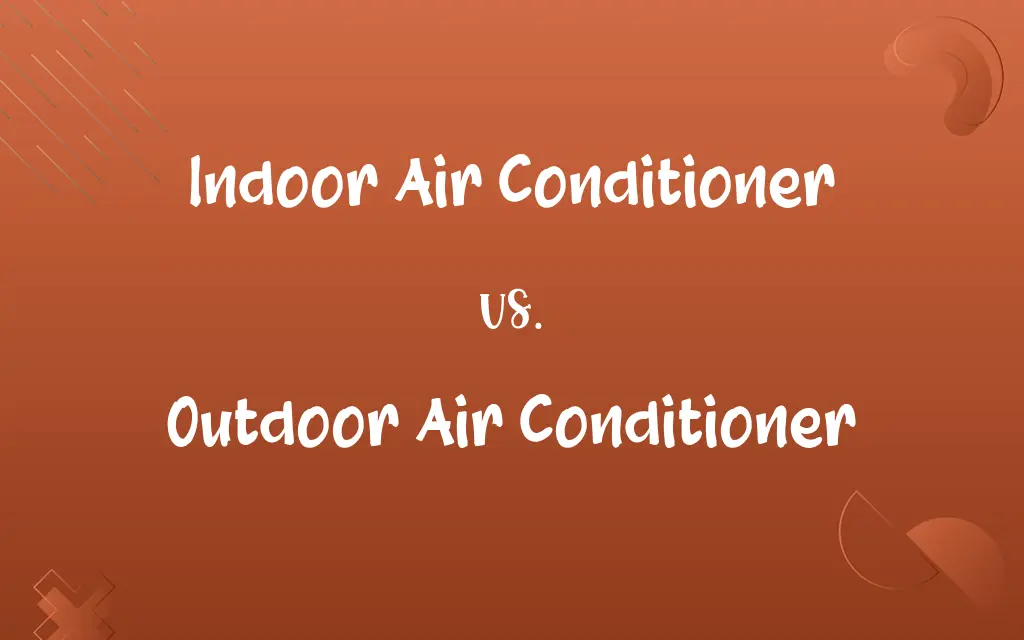Indoor Air Conditioner vs. Outdoor Air Conditioner: Know the Difference

By Shumaila Saeed & Dua Fatima || Published on August 21, 2024
Indoor air conditioners, like portable units, focus on cooling interior spaces directly, often with additional features. Outdoor air conditioners, part of central systems, involve external units that expel heat outside, requiring indoor counterpart.

Key Differences
Indoor air conditioners are designed to operate within the living or working space, directly cooling the air in their immediate environment. These can be standalone units, such as portable air conditioners, or part of a split system where the cooling unit is inside but connected to an outdoor compressor. They often come with features aimed at improving indoor air quality, such as filters for dust and allergens. Outdoor air conditioners, on the other hand, are components of a larger system, typically central air conditioning, where the unit located outside the building houses the compressor, condenser coil, and fan. This setup is responsible for expelling hot air from indoors to the outside.
Shumaila Saeed
Aug 21, 2024
The primary function of indoor air conditioners is to provide comfort by reducing the indoor air temperature and, in many cases, controlling humidity levels. They are particularly suited for apartments, small homes, or specific rooms where installing a complete central air system is impractical or too costly. Outdoor units are essential for the operation of central air conditioning systems, which can cool entire buildings efficiently by circulating chilled air through a network of ducts. This requires a coordinated system with an indoor component, typically an air handler or furnace, to distribute the cooled air.
Shumaila Saeed
Aug 21, 2024
Indoor units offer flexibility and are generally easier and cheaper to install, as they do not require extensive ductwork or significant alterations to the building's structure. However, they might be less efficient overall compared to central systems, especially for cooling larger spaces. Outdoor units, while requiring a more complex and costly installation, provide a more integrated solution for temperature control and are capable of cooling larger areas more uniformly.
Shumaila Saeed
Aug 21, 2024
Maintenance needs also differ; indoor units are usually more accessible for routine cleaning and filter changes, but they might require more frequent attention due to their direct interaction with indoor air. Outdoor units, being exposed to the elements, require professional servicing to ensure the system's efficiency and longevity, including cleaning the coils and checking the refrigerant levels.
Hifza Nasir
Aug 21, 2024
The choice between indoor and outdoor air conditioners depends on several factors, including the size of the space to be cooled, installation budget, efficiency concerns, and whether the building can accommodate the necessary infrastructure for a central air conditioning system.
Dua Fatima
Aug 21, 2024
ADVERTISEMENT
Comparison Chart
Location
Inside living or working spaces
Outside, typically in a backyard or on a building's roof
Dua Fatima
Aug 21, 2024
Function
Directly cools and sometimes purifies the indoor air
Expels hot air outside as part of a central system
Shumaila Saeed
Aug 21, 2024
Installation
Generally easier and less invasive
Requires professional installation and ductwork
Shumaila Saeed
Aug 21, 2024
Cost
Lower upfront cost, but potentially higher operational costs
Higher initial cost, but efficient for large spaces
Shumaila Saeed
Aug 21, 2024
Maintenance
More accessible for regular cleaning, frequent filter changes
Requires professional maintenance, less frequent
Shumaila Saeed
Aug 21, 2024
ADVERTISEMENT
Suitability
Small homes, apartments, specific rooms
Larger homes and buildings with duct systems
Shumaila Saeed
Aug 21, 2024
Efficiency
Less efficient for large spaces, higher for targeted cooling
More efficient for cooling large areas uniformly
Hifza Nasir
Aug 21, 2024
Indoor Air Conditioner and Outdoor Air Conditioner Definitions
Indoor Air Conditioner
Efficiently cools small to medium-sized spaces directly.
A window unit effectively cools a single room during hot weather.
Dua Fatima
Feb 29, 2024
Outdoor Air Conditioner
Part of a central cooling system, housing components like the compressor.
The outdoor unit of a central AC system expels hot air from the home.
Dua Fatima
Feb 29, 2024
Indoor Air Conditioner
Features air purification and humidity control for indoor comfort.
Many indoor units come with HEPA filters to reduce indoor allergens.
Shumaila Saeed
Feb 29, 2024
ADVERTISEMENT
Outdoor Air Conditioner
Requires professional installation and connection to ductwork.
Installing a central AC system involves extensive setup by HVAC technicians.
Shumaila Saeed
Feb 29, 2024
Indoor Air Conditioner
A device that cools room air directly, often portable or part of a split system.
A portable air conditioner can be moved to cool different rooms as needed.
Dua Fatima
Feb 29, 2024
Outdoor Air Conditioner
Designed for durability and efficiency in expelling heat.
Outdoor units are built to withstand weather conditions while operating efficiently.
Hifza Nasir
Feb 29, 2024
Indoor Air Conditioner
Requires regular maintenance like filter cleaning for optimal performance.
Cleaning the filters monthly improves air quality and efficiency.
Shumaila Saeed
Feb 29, 2024
Outdoor Air Conditioner
Offers uniform cooling for larger spaces through a ducted system.
Central AC systems provide consistent temperatures throughout large buildings.
Shumaila Saeed
Feb 29, 2024
Indoor Air Conditioner
Ideal for targeted cooling without extensive installation.
Split air conditioners cool specific areas without ductwork.
Dua Fatima
Feb 29, 2024
Outdoor Air Conditioner
Works in conjunction with an indoor unit to cool entire buildings.
Central air systems use outdoor and indoor units for efficient cooling.
Dua Fatima
Feb 29, 2024
Repeatedly Asked Queries
Do indoor air conditioners require special wiring or outlets?
Some indoor units, especially portable air conditioners, can work with standard outlets, but others, like certain split systems, may require special wiring or outlets. Always check the manufacturer's requirements.
Dua Fatima
Aug 21, 2024
Is it more expensive to run an indoor or outdoor air conditioner?
Running costs depend on various factors, including the unit's efficiency, the space's size, and how frequently it's used. Generally, central systems (outdoor) are more efficient for large spaces, while indoor units can be more costly for the same area.
Shumaila Saeed
Aug 21, 2024
Can I use an indoor air conditioner to cool my entire house?
Indoor units like portable or split air conditioners are best suited for cooling individual rooms or small spaces, not entire houses.
Dua Fatima
Aug 21, 2024
How often should I service my outdoor air conditioner unit?
Professional maintenance is recommended at least once a year to ensure optimal performance and prevent potential issues.
Dua Fatima
Aug 21, 2024
Can I install an outdoor air conditioner unit on my own?
Installing an outdoor unit involves complex steps and requires understanding of refrigerant handling, electrical connections, and ductwork, so it's best left to professionals.
Shumaila Saeed
Aug 21, 2024
How does weather affect outdoor air conditioner units?
Outdoor units are designed to withstand various weather conditions, but extreme conditions can affect performance. Regular maintenance helps mitigate these effects.
Dua Fatima
Aug 21, 2024
Which is better for a rented apartment, an indoor or outdoor air conditioner?
For rented spaces, indoor air conditioners, such as portable or window units, are typically more practical and less invasive to install.
Shumaila Saeed
Aug 21, 2024
Do outdoor air conditioner units need to be covered in winter?
Covering outdoor units in winter can protect them from debris and extreme weather, but it's essential to ensure proper ventilation to avoid condensation and corrosion.
Shumaila Saeed
Aug 21, 2024
Can an outdoor air conditioner work without an indoor unit?
No, outdoor units are part of central air systems and must work in conjunction with an indoor unit to cool a space effectively.
Shumaila Saeed
Aug 21, 2024
How does the efficiency of indoor air conditioners compare to outdoor units?
Outdoor units, as part of central air conditioning systems, generally have higher efficiency ratings for cooling large areas than indoor units, which are more suited for cooling smaller, targeted spaces.
Shumaila Saeed
Aug 21, 2024
What type of refrigerant do indoor and outdoor air conditioners use?
Both indoor and outdoor units typically use environmentally friendly refrigerants, such as R-410A, which do not deplete the ozone layer. The specific type can vary based on the model and manufacturer.
Shumaila Saeed
Aug 21, 2024
Can I move my indoor air conditioner to a different room?
Portable indoor air conditioners can be moved easily, but split system indoor units and window air conditioners require installation and therefore are not easily moved.
Hifza Nasir
Aug 21, 2024
What should I consider when choosing between an indoor and outdoor air conditioner?
Consider factors like the size of the space, installation feasibility, budget, energy efficiency, and specific cooling needs. For larger spaces or whole-home cooling, an outdoor unit as part of a central system is typically more efficient. For individual rooms or temporary solutions, an indoor unit may be more appropriate.
Shumaila Saeed
Aug 21, 2024
Are there energy-efficient models available for both indoor and outdoor air conditioners?
Yes, both indoor and outdoor air conditioners come in energy-efficient models, often indicated by an Energy Star rating, which signifies the unit meets or exceeds energy efficiency guidelines.
Dua Fatima
Aug 21, 2024
Is it possible to install a central air conditioning system in a house without existing ductwork?
Yes, but it requires significant renovation and installation work. Alternative systems, like ductless mini-split systems, may be more suitable for houses without existing ductwork.
Dua Fatima
Aug 21, 2024
What's the environmental impact of using an indoor vs. outdoor air conditioner?
The impact depends on the unit's energy efficiency, refrigerant used, and electricity source. Central systems (outdoor) are generally more efficient for large spaces, potentially offering a lower per-square-foot environmental impact.
Hifza Nasir
Aug 21, 2024
What maintenance tasks can I perform myself on an indoor air conditioner?
For indoor units, users can typically clean or replace air filters, clean air vents, and ensure the unit is free from obstructions. For more complex maintenance, consult a professional.
Dua Fatima
Aug 21, 2024
How long do indoor and outdoor air conditioner units typically last?
With proper maintenance, outdoor units can last 15 to 20 years, while indoor units generally have a lifespan of 10 to 15 years, depending on the type and usage.
Shumaila Saeed
Aug 21, 2024
Can indoor air conditioners improve air quality?
Many indoor air conditioners come with built-in air filters that can remove dust, allergens, and other particles from the air, potentially improving indoor air quality.
Shumaila Saeed
Aug 21, 2024
Share this page
Link for your blog / website
HTML
Link to share via messenger
About Author
Written by
Shumaila SaeedShumaila Saeed, an expert content creator with 6 years of experience, specializes in distilling complex topics into easily digestible comparisons, shining a light on the nuances that both inform and educate readers with clarity and accuracy.
Co-written by
Dua Fatima








































































